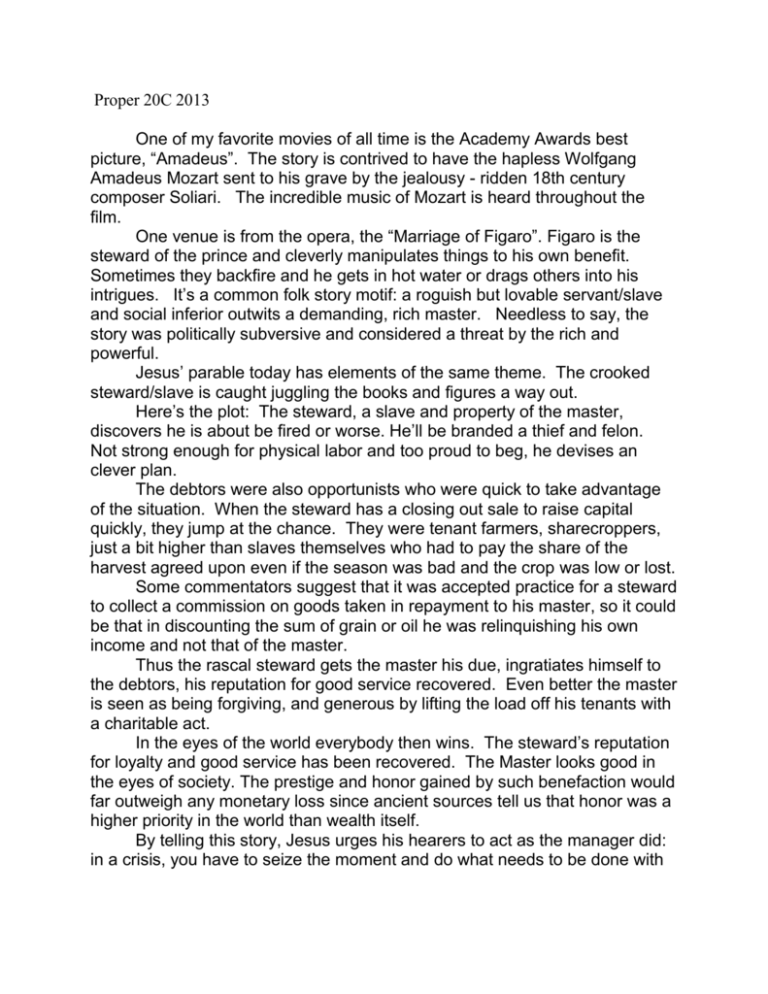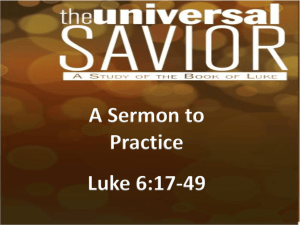Proper 20C 2013 One of my favorite movies of all time is the
advertisement

Proper 20C 2013 One of my favorite movies of all time is the Academy Awards best picture, “Amadeus”. The story is contrived to have the hapless Wolfgang Amadeus Mozart sent to his grave by the jealousy - ridden 18th century composer Soliari. The incredible music of Mozart is heard throughout the film. One venue is from the opera, the “Marriage of Figaro”. Figaro is the steward of the prince and cleverly manipulates things to his own benefit. Sometimes they backfire and he gets in hot water or drags others into his intrigues. It’s a common folk story motif: a roguish but lovable servant/slave and social inferior outwits a demanding, rich master. Needless to say, the story was politically subversive and considered a threat by the rich and powerful. Jesus’ parable today has elements of the same theme. The crooked steward/slave is caught juggling the books and figures a way out. Here’s the plot: The steward, a slave and property of the master, discovers he is about be fired or worse. He’ll be branded a thief and felon. Not strong enough for physical labor and too proud to beg, he devises an clever plan. The debtors were also opportunists who were quick to take advantage of the situation. When the steward has a closing out sale to raise capital quickly, they jump at the chance. They were tenant farmers, sharecroppers, just a bit higher than slaves themselves who had to pay the share of the harvest agreed upon even if the season was bad and the crop was low or lost. Some commentators suggest that it was accepted practice for a steward to collect a commission on goods taken in repayment to his master, so it could be that in discounting the sum of grain or oil he was relinquishing his own income and not that of the master. Thus the rascal steward gets the master his due, ingratiates himself to the debtors, his reputation for good service recovered. Even better the master is seen as being forgiving, and generous by lifting the load off his tenants with a charitable act. In the eyes of the world everybody then wins. The steward’s reputation for loyalty and good service has been recovered. The Master looks good in the eyes of society. The prestige and honor gained by such benefaction would far outweigh any monetary loss since ancient sources tell us that honor was a higher priority in the world than wealth itself. By telling this story, Jesus urges his hearers to act as the manager did: in a crisis, you have to seize the moment and do what needs to be done with courage and decisiveness.....The steward acted shrewdly to take care of his own future.. Here’s the point......Salvation is also a dire situation. What we do or not do affects not only our lives for eternity but also peace and security. The political and economic practices we exercise in our dealings with one another will affect justice and the well-being of not only ourselves but all the world. If we are wise in the ways of the world, we need to be wise in the ways of the spirit. The Christian is to be as eager and ingenious in attempts to attain goodness just like we are in our attempts to attain money and comfort. If we would give as much attention to the things which concern our souls as we do to the things which concern our business, our Christianity will begin to be real and effective. Furthermore, If things are improving for those in all levels of society from those in poverty, those barely making it, those struggling to stay in the middle class and even the well off and rich, everyone will benefit. It’s the opposite of trickle down economic. When there is more across the board, there is a bigger pie and the slices are bigger accordingly. Jesus makes several points about God and wealth. (The word mammon was meant to personify wealth and riches so that we know we are caught in a struggle of allegiance between God Almighty and the god of money.) After telling the parable Jesus talks about faithfulness and honesty. First, faithfulness is not tied to wealth and power. If you are faithful in little things, you can be counted on to be faithful in big things. If you fail the little ones, you will fail the big ones too. So, no big dreams of all the things you would do for Jesus when the chips are down, if you are not doing the little things for Jesus on a daily basis. Second, faithfulness in earthly things has a direct relationship to our treasure in heaven where our true wealth is to be found. Third, the most familiar part of this passage: You cannot serve two masters, in this case, God and wealth. This does not mean that wealthy people cannot serve God. We all know they can and do. The matter is not over having wealth; it is a matter of who owns what. Do we own our wealth , so that we make decisions about its use for God? Or does our wealth own us, so that all our decisions and actions are based on holding on to it? Possessions are not in themselves a sin, but they are a great responsibility, and when used to help our friends, to serve God’s people, we are being transformed to live in the world to come. One’s true wealth would consist not in what we keep, but in what we give away. St. Paul gives the answer of how to live IN the world yet not be OF the world. He says to handle living in the here and now so that we may rejoice in the hereafter. Something has turned the congregation to which he is writing inward and made it insulated and isolated. The Apostle’s remedy is to turn to Jesus, our only Mediator and Advocate before God, and pour out all our concerns for ourselves and others, for leaders, rulers, officials that we and they will use our talents and skills for the betterment of all. Here is the question for today. Are we going to grow in faith and towards putting God’s ways to be our ways? Are we willing to be responsible stewards of whatever wealth or power we have for the sake of others? Are we able to be “wise as serpents yet gentle as doves”? Remembering Christ Jesus in all things, both small and big, puts our loyalty to God first in our desire for security, comfort, and safety. We have a calling that captures our hearts and wallets. It has done so in ages past for countless numbers who have believed and known the joy and peace that comes from faith in Jesus our Lord, our Savior, our Lover, our Friend, now and forever. Amen.







